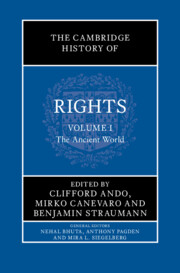Refine search
Actions for selected content:
24618 results in Ancient history
Long descriptions
-
- Book:
- Political Violence in Ancient Greece
- Published online:
- 05 January 2026
- Print publication:
- 05 February 2026, pp 291-315
-
- Chapter
- Export citation
2 - Stasis Narratives
- from Part I - What Was Stasis?
-
- Book:
- Political Violence in Ancient Greece
- Published online:
- 05 January 2026
- Print publication:
- 05 February 2026, pp 27-45
-
- Chapter
- Export citation
Figures
-
- Book:
- Political Violence in Ancient Greece
- Published online:
- 05 January 2026
- Print publication:
- 05 February 2026, pp vii-viii
-
- Chapter
- Export citation
Acknowledgments
-
- Book:
- Political Violence in Ancient Greece
- Published online:
- 05 January 2026
- Print publication:
- 05 February 2026, pp xii-xii
-
- Chapter
- Export citation
8 - Beyond Thebes
- from Part II - The Frequency of Stasis
-
- Book:
- Political Violence in Ancient Greece
- Published online:
- 05 January 2026
- Print publication:
- 05 February 2026, pp 168-204
-
- Chapter
- Export citation
Tables
-
- Book:
- Political Violence in Ancient Greece
- Published online:
- 05 January 2026
- Print publication:
- 05 February 2026, pp ix-x
-
- Chapter
- Export citation
Appendix B - Expanded References for (Recognized and Probable) Staseis
- from Long descriptions
-
- Book:
- Political Violence in Ancient Greece
- Published online:
- 05 January 2026
- Print publication:
- 05 February 2026, pp 310-315
-
- Chapter
- Export citation
Conclusion
- from Part III - The Intensity of Stasis
-
- Book:
- Political Violence in Ancient Greece
- Published online:
- 05 January 2026
- Print publication:
- 05 February 2026, pp 279-290
-
- Chapter
- Export citation
Notes and Abbreviations
-
- Book:
- Political Violence in Ancient Greece
- Published online:
- 05 January 2026
- Print publication:
- 05 February 2026, pp xiii-xiv
-
- Chapter
- Export citation
4 - The Frequency of Stasis
- from Part II - The Frequency of Stasis
-
- Book:
- Political Violence in Ancient Greece
- Published online:
- 05 January 2026
- Print publication:
- 05 February 2026, pp 55-77
-
- Chapter
- Export citation
9 - The Violence of Stasis: An Introduction
- from Part III - The Intensity of Stasis
-
- Book:
- Political Violence in Ancient Greece
- Published online:
- 05 January 2026
- Print publication:
- 05 February 2026, pp 207-221
-
- Chapter
- Export citation
7 - The Frequency of Stasis at Thebes
- from Part II - The Frequency of Stasis
-
- Book:
- Political Violence in Ancient Greece
- Published online:
- 05 January 2026
- Print publication:
- 05 February 2026, pp 141-167
-
- Chapter
- Export citation

Myth, Text and Image in Ancient Mesopotamia
- A Narrative Reading of the World
-
- Published online:
- 03 February 2026
- Print publication:
- 26 March 2026

The Cambridge History of Rights
-
- Published online:
- 31 January 2026
- Print publication:
- 27 November 2025

The Cambridge Introduction to the Old Testament
-
- Published online:
- 30 January 2026
- Print publication:
- 19 February 2026
-
- Textbook
- Export citation

Calendar, Cult, and Law in Rome to the Age of Augustus
-
- Published online:
- 28 January 2026
- Print publication:
- 19 February 2026

Age, Gender and Status in Macedonian Society, 550-300 BCE
- Intersectional Approaches to Mortuary Archaeology
-
- Published by:
- Edinburgh University Press
- Published online:
- 27 January 2026
- Print publication:
- 31 December 2023

Toxic Masculinity in the Ancient World
-
- Published by:
- Edinburgh University Press
- Published online:
- 27 January 2026
- Print publication:
- 31 December 2023

Believing Ancient Women
- Feminist Epistemologies for Greece and Rome
-
- Published by:
- Edinburgh University Press
- Published online:
- 24 January 2026
- Print publication:
- 31 December 2023

Premodern Economies
- A Global Perspective
-
- Published online:
- 22 January 2026
- Print publication:
- 31 March 2026
